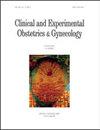子宫内膜容受性与多囊卵巢综合征;子宫内膜基因表达的特异性&文献综述
IF 0.6
4区 医学
Q4 OBSTETRICS & GYNECOLOGY
引用次数: 3
摘要
目的:本综述的目的是概述关于多囊卵巢综合征子宫内膜基因表达特异性的现有研究,以及将这些特异性与多囊卵巢综合症的生殖和产科后果联系起来的可能分子机制。机制:多囊卵巢综合征(PCOS)是一种复杂的疾病,具有生殖、代谢和心理障碍的特点。代谢、炎症和内分泌异常对排卵功能和卵母细胞质量的影响已被视为多囊卵巢综合征妇女的主要生殖问题。然而,即使在排卵恢复后,这一组的生殖结果也低于预期。参与调节子宫内膜容受性的基因的功能相关序列改变也可能与多囊卵巢综合征相关,这是一种独立于子宫内膜外影响的特性。研究结果:雄激素过多、排卵功能障碍和胰岛素抵抗与子宫内膜基因表达的改变有关,导致PCOS患者子宫内膜接受能力不理想。子宫内膜类固醇受体功能异常似乎是多囊卵巢综合征内在子宫内膜接受能力不理想的一个持续因素。结论:不应排除表观遗传学或表观基因组学改变PCOS子宫内膜水平基因表达的机制。未来的研究应侧重于调查每种多囊卵巢综合征表型的特异性,并制定个性化的治疗策略,以满足每一位多囊卵巢综合症患者的特定需求。本文章由计算机程序翻译,如有差异,请以英文原文为准。
Endometrial receptivity and PCOS; endometrial gene expression specificities — literature review
Objectives: The purpose of this review is to provide an overview of existing studies on the specificities of gene expression in the endometrium in PCOS and possible molecular mechanisms linking those specificities with reproductive and obstetric consequences of PCOS. Mechanism: Polycystic ovary syndrome (PCOS) is a complex disorder combining features of reproductive, metabolic, and psychological disturbances. The effect of metabolic, inflammatory, and endocrine abnormalities on ovulatory function and oocyte quality has been seen as the main reproductive issue in PCOS women. However, even after the restoration of ovulation, this group exhibits lower than expected reproductive outcomes. Functionally relevant sequence alterations in genes involved in regulating endometrial receptivity could also be relevant in PCOS as a property independent of extra-endometrial influences. Findings: Hyperandrogenism, ovulatory dysfunction, and insulin resistance are associated with the alterations in endometrial gene expressions leading to suboptimal endometrial receptivity in PCOS. Endometrial steroid receptor malfunction seems to be a contibuting factor to the intrinsic suboptimal endometrial receptivity in PCOS. Conclusion: epigenetic or epigenomics mechanisms altering gene expressions on the endometrial level in PCOS should not be ruled out. Future studies should focus on investigating specificities of each PCOS phenotype and developing individual treatment strategies to meet the specific needs of every PCOS patient.
求助全文
通过发布文献求助,成功后即可免费获取论文全文。
去求助
来源期刊
CiteScore
0.50
自引率
0.00%
发文量
241
审稿时长
1 months
期刊介绍:
CEOG is an international, peer-reviewed, open access journal. CEOG covers all aspects of Obstetrics and Gynecology, including obstetrics, prenatal diagnosis, maternal-fetal medicine, perinatology, general gynecology, gynecologic oncology, uro-gynecology, reproductive medicine, infertility, reproductive endocrinology, sexual medicine. All submissions of cutting-edge advances of medical research in the area of women''s health worldwide are encouraged.

 求助内容:
求助内容: 应助结果提醒方式:
应助结果提醒方式:


